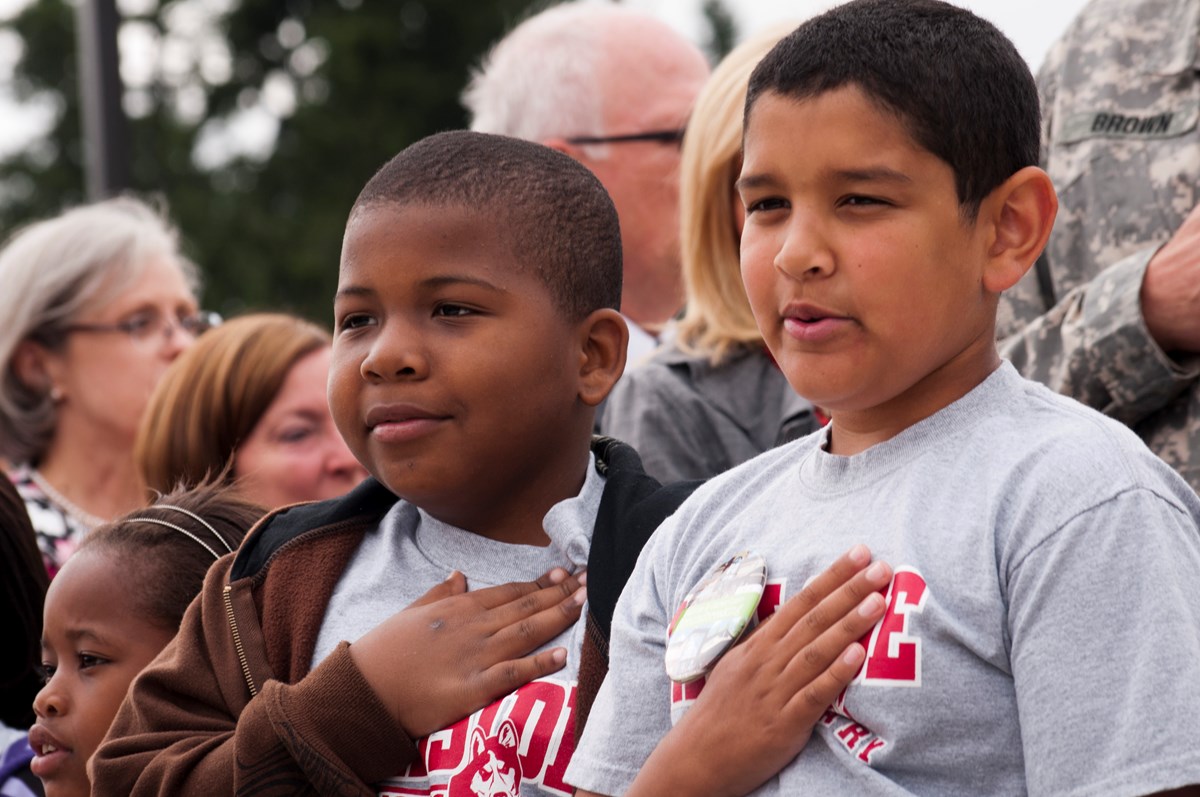A 16-year-old junior at Lebanon High School in Eastern Pennsylvania is suing his school district in federal court claiming his civil rights have been violated. As is the case across much of the country, everything at Lebanon High comes to a standstill for a minute or so every day as students recite the Pledge of Allegiance. Across the country, most people stand for the ritual, but every now and then someone chooses not to participate. This is usually less a problem than a curiosity. Right until it isn’t.
Unconstitutional Coercion
According to X.F.’s account (minor litigants are not mentioned by name), a teacher required him to stand for the pledge. When he refused, he was disciplined. Repeatedly. After a number of in-school suspensions, X.F. was given a copy of the district’s policy on the matter, which seems quite clear. “Each student shall,” the policy reads, “be required to salute the flag and recite the Pledge of Allegiance during each day’s opening exercises.”
The policy goes on to say that conscientious objectors will be permitted to opt out if they “maintain a respectful attitude throughout the ceremony,” and if their parents “furnish the school with a written statement of their child’s conscientious objection.”
Justice Robert Jackson explains that "no official, high or petty, can prescribe what shall be orthodox in politics, nationalism, religion, or other matters of opinion”
All of this is patently unconstitutional, and any educator—let alone one who works for a government school—should know as much.
The Supreme Court settled this issue in 1943 when it ruled on a case, West Virginia State Board of Education v. Barnette, in which Jehovah’s Witnesses were punished for not standing for the pledge. While the case was brought on religious grounds, the court ruled much more broadly, asserting that the First Amendment not only prohibited the government from silencing speech, it also prohibited the government from compelling speech.
In his majority opinion, Justice Robert Jackson could not have been more clear. “If there is any fixed star in our constitutional constellation,” he wrote, “it is that no official, high or petty, can prescribe what shall be orthodox in politics, nationalism, religion, or other matters of opinion or force citizens to confess by word or act their faith therein.”
It is hard to believe that the petty officials at Lebanon High missed this memo. It becomes even more ludicrous when one considers that Pennsylvania’s government was reminded of this ruling not even 20 years ago.
Pennsylvania's Mandate
After the 9/11 attacks, Pennsylvania’s General Assembly mandated that all public, private and religious schools recite the Pledge or sing “The Star-Spangled Banner.” Apparently aware of the Barnette decision, the Legislature did not require students to participate. The Legislature did, however, require that schools notify the parents of students who did not comply.
The Third Circuit Court of Appeals ruled in 2004 that even this violated the First Amendment.
Given that it is unconstitutional, a compelled pledge violates the freedoms the flag is supposed to represent in the first place.
After the 1943 Barnette decision, and the 2004 Third Circuit ruling, it’s hard to believe that there is a single petty official in Pennsylvania who isn’t keenly aware that compelling speech in the name of patriotism is in no way constitutional.
But even if it were, it would nonetheless be undesirable. A compelled pledge of allegiance means nothing. Worse, given that it is unconstitutional, a compelled pledge violates the freedoms the flag is supposed to represent in the first place.


